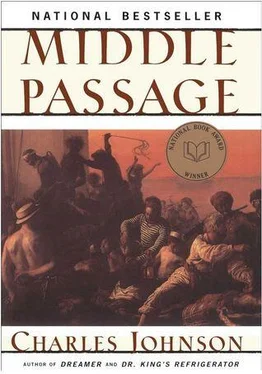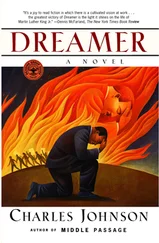I rubbed my eyes and waded forward cautiously toward the cookroom. The helm was unattended. The wooden steering wheel, with its spokes that favored a Hindu mandala, revolved slowly in winds that spun the crippled ship in a circle, without direction. Without destination. We were dead in the water. Adrift. A creaking hulk of coppice oak tossing about on a sea the color of slate. Finally, I heard motion. Even fainter still, a madhouse cackle that seemed to come from the crow’s-nest. Then more shapes, like figures in a shadowgraph, appeared gathered by the foremast. Many of the sailors were face down and knocked for seven bells. Some had surrendered after a one-sided battle that appeared to be over-weighted, strange as this sounds, toward the Allmuseri who used the slippery deck to their advantage. They had been in chains before, I remembered. Taken in raids by other tribes. Consequently, capoeira, or their close-quarter version of it, was based on doing battle after they were bound: knee-shattering kicks thrown after they’d fallen. Ankle-breaking footsweeps. Chokes designed to use their chains until one of them found the key to their shackles, and those freed swung the ship’s cannon back toward her bridge. Engaged as they were in disarming the remaining sailors, none had seen my approach. I eased backward, and felt fingers dig painfully into my arm.
“Come to the fo’c’s’le,” said Ngonyama. He was wearing Captain Falcon’s cap. “If you wish to plead for the lives of any of these men, that time is now.”
“You plan to kill them?”
“That decision isn’t mine, Rutherford.”
“This morning you said you’d set them free!”
He thought for a moment, his left hand bandaged, I saw then, a bloody mess where the dogs had torn away three of his fingers. “As I said, the decision isn’t mine.”
I followed him to the forecastle. Then I heard first the low voices of men whispering, then loud ones in disagreement, and soon two lanterns blinked as someone moved across the room. Ngonyama stepped to one side, bidding me enter first. Stepping inside, placing my hand over one eyeball — as children do — I peered past the door rail to see what was inside, and when I saw what was inside I moaned. Everything was in ruin. Sea chests had been smashed open. Cabinets overturned. Inside, Cringle was seated amidst this debris on a straight-backed chair close to the east wall, with hieroglyphs of lamplight dancing on his scarred forehead. He bled from a gash that trenched open skin by his nose then deepened and disappeared into his hairline. His head drooped. His hands, I noticed, were bound with luff rope, his ankles with shreds from his waistcoat. His bare chest was crosshatched with scars. And, no. He was not alone. I saw three Allmuseri sitting on the benches; I recognized two more named Babo and Francesco passing a bottle of the skipper’s best bellywash, and still another called Atufal, a big man who had an iron collar around his neck and stood behind the mate arguing — if my hasty translation could be trusted — for them to toss him over the side.
My entrance stopped all conversation. I stepped forward and came as close as I durst from the doorway.
“All the way in— njoo hapa.” Ngonyama smiled two rows of black-veined teeth. “No one will hurt you here, Rutherford. These men are your brothers.” How I wished I could believe him! Cringle tried to speak, but the one called Atufal seized his hair, yanking back his head. The strands stood out like stalks. His throat was bared. Against this white stalk the little black named Babo placed an English handsaw. Atufal said again that the mate should be killed. Ngonyama listened. He began to pace, and prime a horse pistol. The others tossed Cringle’s life back and forth among them, some grumbling aye— yebo in Allmuseri — to his execution, then making a clean slate of the crew; some like Ngonyama saying la , or nay. Contrary to what I’d expected, they were in no mood to celebrate their victory. They were too tired and frightened for that, as well they should be. This battered rag-wagon was home until they found land. And what then? A firing squad, most likely. Whether they put to in Bangalang, or Louisiana, or any New World port, they would be cut down like wheat. No Yankee court would free them. They were still chattel, according to white men’s law. Ngonyama, who was nobody’s fool, knew this to be fact. He wanted the killing to end. They were not free men yet, he told the others, only free of the stinking hold. Gently he pulled me toward a chair. “You must help us,” he began. “There is so much to unravel. .”
My fingertips on the seat, I sat lightly, tipped forward and ready to spring, for still I did not trust him. Yes, I was black, as they were, but they had a common bond I could but marvel at. The little black Babo, who had always seemed so servile before, sat sharpening a hatchet with cloth and stone, a strip of some sailor’s coat bandaging half his head so that only one eye was uncovered. The other, Atufal, whom Falcon often shackled to the ringbolts on deck, had gone kill-crazy during the mutiny, shooting and stabbing our sailors and his own tribesmen as well, striking down in his fear anything that moved toward him. He’d taken a musket ball in his left shank, which was mangled, white bone visible through the black flesh of his thigh, but still he seemed more pleased than pained. All of them were injured and exhausted, but transfigured by their victory. Was it my victory as well? Or was Ngonyama only saving my life for some scheme? “Start with Falcon,” I said. “What have you done with the skipper?”
Ngonyama bit down his lip and walked to a window, righting overturned chairs as he went. He kept his back to me. “Nacta is guarding him in his cabin. Don’t plead for him, Rutherford.” His shoulders drew in. “It would be a sin to let him live. He is responsible for every death on board.”
“That’s a lie!” flashed Cringle. “ ’Twas he set them free during the fight. I saw him! We were exhausted, some of us sick, and that one”—he flicked his head at Babo—“killed Daniels, who had keys to their leg-irons, and let the others loose. They clubbed us with the wood we gave them for pillows and tossed the dead like Tommy into the sea. And he—”
Atufal’s hand stifled the rest. Babo placed his hatchet down on the mate’s neck. He slanted his eyes toward Ngonyama, seeking the sign for them to kill him. Ngonyama shook his head. No. But he was alone in his decision. Three of them I recognized as warriors named Ghofan, Diamelo, and Akim urged Babo to open the mate’s throat. And they had reason, good reason, for seeing the last of the Republic’s officers dead. Akim, a wide, dark-fired man who was short but had the strength of three, squatted on his hams; he made them relive his sister’s death five days after we set sail. Ghofan, a black who had been gelded, and then suffered the torture of the brand, pulled his shirt down to show them how Falcon had burned in the initials ZS not once but three times until the impression was as clear as stigmata, or the markings on cattle. Each man had his atrocity to tell. If not brutality to them then a beadroll of humiliations the midshipmen had inflicted upon the women, two of whom had been raped, or on their children, and to this list Diamelo added the small but nonetheless violent assaults on their spirit — parading them naked for bathing before their own children, forcing them to eat by ramming fingers down their throats, answering their wild clawing from the hold with gales of laughter. On and on the charges came, and with each accusation a finger was stabbed toward the mate. Mercifully, he understood none of what they said. He was quietly whispering to himself the Lord’s Prayer. Against this evidence of American crimes perpetrated on the Allmuseri, Ngonyama was helpless. His plea for sparing Cringle’s life was shouted down. I felt my face kindling. My stomach made a turn. Glaring at Babo, Akim slashed the air with his hand. Therewith, Babo’s fingers tightened the blade on Cringle’s neck. The mate closed his eyes.
Читать дальше












